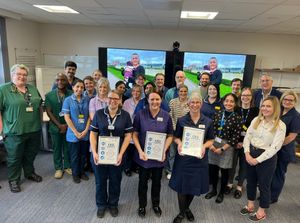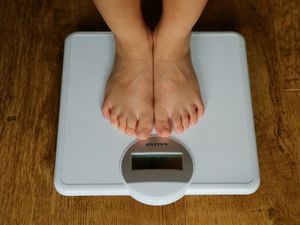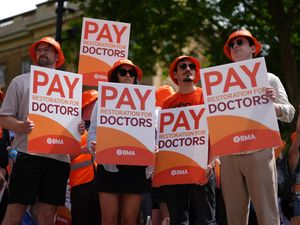Heavily pregnant mother suffers cardiac arrest at hospital - hero medics save her life and deliver her baby
A pregnant mother and her new baby were saved by hero medics after she suffered a cardiac arrest in a hospital waiting room.
Natasha Sokunbi, from Stafford, was 37 weeks pregnant when she was advised to attend Royal Stoke University Hospital.
On December 3, Natasha, 30, attended the emergency department after suffering difficulty breathing, chest pains and a persistent cough. However she went into cardiac arrest in the waiting area.
Quick-thinking staff from trauma, obstetric, anaesthetist and maternity leapt into action and delivered the life-saving treatment. It was during this time that baby Beau was safely delivered via emergency caesarean section weighing 6lbs 7oz.
Natasha, originally from the South Wales valleys, said: “I wasn’t feeling well for a couple of weeks because of chest infection. On that morning I called 111 who advised me to make my way to the Royal Stoke.
“After suffering the cardiac arrest, I can remember parts of my treatment before waking up in Critical Care. My first thought was 'where’s my kids'. I didn’t know what gender baby I was having until my husband told me and showed me a photo of Beau.
“When she came to visit me, I couldn’t hold her very well, but I always tried to do skin to skin with her. Being a mum of two is great and I’m regaining my strength and independence.
“Beau is a miracle, and you can never fully put what they’ve done for us it into words. The staff were all fantastic. Now I’m much more appreciative of life and won’t take anything for granted ever again.”
One of the first doctors to respond to Natasha’s cardiac arrest was Dr Andrew Bennett, specialist doctor in emergency medicine. He said: “The issue when you have a mother who goes into cardiac arrest is that you not only have the team required to resuscitate mum, you very quickly of course when the baby is out, also have a team ready to resuscitate the baby if that’s required.
“So the number of clinical teams involved is huge. This has got to be one of the proudest moments that this department really has ever seen and that collaborative effect from all involved was incredible.”

Following the emergency procedure, Natasha was placed in an induced coma and transferred to UHNM’s Critical Care Unit, whilst Beau received care from specialist paediatric and neonatal teams. It was during her hospital recovery that Natasha had an implantable cardioverter defibrillator (ICD) fitted.
Senior sister, Alison Hopwell, who has worked in the emergency department for 37 years, described it as one of the proudest moments of her career. She said: “It’s a rare event but it happened and it happened on a very very busy December morning. The department was very busy; however, the whole team, too many to mention, from all specialties pulled together on that morning.
“I’ve worked in the NHS for 40 years, I’ve worked in University Hospitals of North Midlands emergency department for 37 of those years and this is one of the proudest moments of my career for a number of reasons. For the fact that the outcome was so superb and for the humbling feeling I got from working in such an awesome professional team.”
Now in recognition of their actions staff involved in the care of Natasha and Beau have been presented with the Chief Executive Award.
Dr Simon Constable, chief executive, said: “We read so much about what goes on in emergency departments and the pressure that emergency departments are under. This is a reminder that behind every patient there is a story and it’s not just about numbers.
“Natasha’s case is about as serious as it gets and involves not just one person but multiple teams looking after and getting the outcome for her and Beau. So it’s a great testament to the real skill and team work that made the outcome what it is because it could have been so very different and I think we recognise that would have been a tragedy.”




